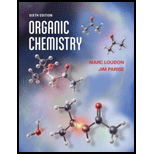
Concept explainers
(a)
Interpretation:
The structure of the given compound is to be drawn.
Concept introduction:
The naming of the chemical compound is done using the parameters given by IUPAC. IUPAC stands for International Union of Pure and Applied Chemistry. This system of nomenclature is accepted worldwide. The IUPAC system provides the set of rules in order to do the naming of the chemical compounds.
(b)
Interpretation:
The structure of the given compound is to be drawn.
Concept introduction:
The naming of the chemical compound is done using the parameters given by IUPAC. IUPAC stands for International Union of Pure and Applied Chemistry. This system of nomenclature is accepted worldwide. The IUPAC system provides the set of rules in order to do the naming of the chemical compounds.
(c)
Interpretation:
The structure of the given compound is to be drawn.
Concept introduction:
The naming of the chemical compound is done using the parameters given by IUPAC. IUPAC stands for International Union of Pure and Applied Chemistry. This system of nomenclature is accepted worldwide. The IUPAC system provides the set of rules in order to do the naming of the chemical compounds.
Want to see the full answer?
Check out a sample textbook solution
Chapter 2 Solutions
Organic Chemistry
- II. Draw structures corresponding to the following IUPAC names: (a) 3,4-Dimethylnonane (b) 3-Ethyl-4,4-dimethylheptane (c) 2,2-Dimethyl-4-propyloctane (d) 2,2,4-Trimethylpentanearrow_forwardDraw structures corresponding to the following IUPAC names: (a) 2-Chloro-3,3-dimethylhexane (b) 3,3-Dichloro-2-methylhexane (c) 3-Bromo-3-ethylpentane (e) 4-sec-Butyl-2-chlorononane (d) 1,1-Dibromo-4-isopropylcyclohexane () 1,1-Dibromo-4-tert-butylcyclohexanearrow_forwardDraw both condensed and line structures corresponding to the following IUPAC names:(a) 3-Methylhept-1-ene (b) 4,4-Dimethylpent-2-yne(c) 2-Methylhex-3-ene (d) 1,3,3-Trimethylcyclohexenearrow_forward
- (b) Draw structures corresponding to the following IUPAC names. (a) 3,4-Dimethylnonane (c) 2,2-Dimethyl-4-propyloctane (d) 2,2,4-Trimethylpentane (b) 3-Ethyl-4,4-dimethylheptanearrow_forwardDraw the expanded formula of the following compounds: (a) 3,3-Diethyl-2,5-dimethylnonane (b) 3-Cyclobutylhexane (c) 1,3-Dibromo-5-methylcyclohexanearrow_forwardWhich of the following cycloalkanes are capable of geometric (cis-trans) isomerism?Draw the cis and trans isomers.(a) 3-ethyl-1,1-dimethylcyclohexane (b) 1-ethyl-3-methylcycloheptane(c) 1-ethyl-3-methylcyclopentane (d) 1-cyclopropyl-2-methylcyclohexanearrow_forward
- Draw the line formulas for the two molecules. (a) 3-ethyl-5,5-dimethyl-4-propyloctane (b) (trans)-1-bromo-2-(1,1-dimethylethyl) cyclobutanearrow_forwardExplain why each of the following is an incorrect IUPAC name. Write the correct IUPAC name for the compound. (a) 1,3-Dimethylbutane (b) 4-Methylpentane (c) 2,2-Diethylbutane (d) 2-Ethyl-3-methylpentane (e) 2-Propylpentane (f) 2,2-Diethylheptane (g) 2,2-Dimethylcyclopropane (h) 1-Ethyl-5-methylcyclohexanearrow_forward2. Each of the following names is incorrect. Give thee correct name for each compound (a) 2,3-diethylhexane (b) 2,3-dimethyl-3-propylpentane (c) 2-ethylpropylcyclohexanearrow_forward
- Draw the structures corresponding to the following names(a) 2-chloro-3,3-dimethylhexane (b) 3,3-dichloro-2-methylhexane( c) 3-bromo-3-ethylpentane(d) 2-bromo-5-chloro-3-methylhexanearrow_forwardThe following names are incorrect. Write the structural formula that agrees with the apparent name, and then write the correct name of the compound.(a) 2-Ethylbutane(b) 2-Isopropyl-2-methylpentane(c) 5-Ethyl-1,1-methylcyclopentane(d) 3-Ethyl-3,5,5-trimethylhexane(e) 1,2-Dimethyl-4-ethylcyclohexane(f) 2,4-Diethylpentane(g) 5,5,6,6-Methyl-7,7-ethyldecanearrow_forwardDraw the skeletal structures of the following molecules.(a) (4E)-2,4-dimethyl-1,4-hexadiene (b) cis-3,3-dimethyl-4-propyl-1,5-octadiene (c) trans-2,2,5,5-tetramethyl-3-hexenearrow_forward
 ChemistryChemistryISBN:9781305957404Author:Steven S. Zumdahl, Susan A. Zumdahl, Donald J. DeCostePublisher:Cengage Learning
ChemistryChemistryISBN:9781305957404Author:Steven S. Zumdahl, Susan A. Zumdahl, Donald J. DeCostePublisher:Cengage Learning ChemistryChemistryISBN:9781259911156Author:Raymond Chang Dr., Jason Overby ProfessorPublisher:McGraw-Hill Education
ChemistryChemistryISBN:9781259911156Author:Raymond Chang Dr., Jason Overby ProfessorPublisher:McGraw-Hill Education Principles of Instrumental AnalysisChemistryISBN:9781305577213Author:Douglas A. Skoog, F. James Holler, Stanley R. CrouchPublisher:Cengage Learning
Principles of Instrumental AnalysisChemistryISBN:9781305577213Author:Douglas A. Skoog, F. James Holler, Stanley R. CrouchPublisher:Cengage Learning Organic ChemistryChemistryISBN:9780078021558Author:Janice Gorzynski Smith Dr.Publisher:McGraw-Hill Education
Organic ChemistryChemistryISBN:9780078021558Author:Janice Gorzynski Smith Dr.Publisher:McGraw-Hill Education Chemistry: Principles and ReactionsChemistryISBN:9781305079373Author:William L. Masterton, Cecile N. HurleyPublisher:Cengage Learning
Chemistry: Principles and ReactionsChemistryISBN:9781305079373Author:William L. Masterton, Cecile N. HurleyPublisher:Cengage Learning Elementary Principles of Chemical Processes, Bind...ChemistryISBN:9781118431221Author:Richard M. Felder, Ronald W. Rousseau, Lisa G. BullardPublisher:WILEY
Elementary Principles of Chemical Processes, Bind...ChemistryISBN:9781118431221Author:Richard M. Felder, Ronald W. Rousseau, Lisa G. BullardPublisher:WILEY





